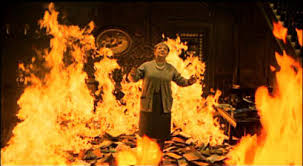News From The Stacks: An introduction
 My name is Cassandra and I am the owner of an old- and antique-book store on the Florida seabord. I see my calling, my role in society, as rescuing books and holding them for their next readers. Some of them (the books, not the readers) are very old and their edition has become rather scarce, some of them are newer but might be just as rare. If a certain book has over a hundred entries in Abebooks.com, I might not keep it at all, just divert it to Vietnam Veterans where, I hope, they will live again. For you see, books come back to life only when they are being read. When they are stored on a shelf, they are dormant, their voices stilled, closed kernels with their potential energy bound deep within them, clasping the treasured germ that will sprout only on the day when somebody lifts it from its ledge, dusts it off, opens it up, and gleans its kinetic energy.
My name is Cassandra and I am the owner of an old- and antique-book store on the Florida seabord. I see my calling, my role in society, as rescuing books and holding them for their next readers. Some of them (the books, not the readers) are very old and their edition has become rather scarce, some of them are newer but might be just as rare. If a certain book has over a hundred entries in Abebooks.com, I might not keep it at all, just divert it to Vietnam Veterans where, I hope, they will live again. For you see, books come back to life only when they are being read. When they are stored on a shelf, they are dormant, their voices stilled, closed kernels with their potential energy bound deep within them, clasping the treasured germ that will sprout only on the day when somebody lifts it from its ledge, dusts it off, opens it up, and gleans its kinetic energy.
Snippets, facets and vignettes from the life of a bookseller of used and antique books, and her employees and volunteers, all running amok.
So I say that I am in the same business as those folks deep in the ice mountain of Svalbard, beyond the Arctic Circle, where a plethora of seeds from all over the world is stored in huge vaults and kept in a constant deep freeze to guarantee their survival in case of global calamity. My threat here in Florida is perhaps not so cataclysmic; I just have to ward off the humidity and the occasional bookworm, which, here in sub-tropical lush balminess, takes the form of silverfish. Beautiful, etheral creatures they are (in my geographic area they are all a silvery-white), dusty, fast and nocturnal, like ghosts, I suppose, but detrimental to the glue in book bindings. They become nothing when you squash them underfoot. Therefore, the air conditioner is on day and night, so that the humidity descends to a level that keeps the silverfish from meddling in the stacks.
Another difference between Svalbard and my bookstore is that here, anybody can come in from off the street, or visit on a virtual highway, and grab whatever book she or he fancies. They say that with global warming Florida will go underwater, in which case my books will be submerged, a cathédrale engloutie of arts and letters, sciences and history, biographies, bibliographies and hagiographies, pages floating about like thin phantasmagoric manta rays, the sun’s rays with difficulty descending to lend a shimmering luminosity to the books too heavy to float: The Red and the Black, Pride and Prejudice, War and Peace, Franny and Zooey. Franny might fall away from Zooey. Until this oceanic turbulence ensues, however, my books are dry and healthy. Some books might spend some time in the book hospital, but my friends and fellow bibliophiles, Marie and Roy, make sure that spine covers don’t fall off, the endpapers are not bent over, and the dust jackets are not ripped. They also tend the rows of stacks as they might do flocks of sheep, so wayward books come back to their proper places. They also fill up any lacunae and, miraculously, create new room for the latest arrivals. “We have incoming!” is a frequent cry among us, as one of us espies from the window a car drive up, the driver open the trunk, and prepare to bring in a box or six filled with wondrous new adventures. We take in just about all books, knowing that Vietnam’s Veterans will pick up the slack. We sometimes wonder how a Vietnam veteran will deal with bodice-rippers or French Women Don’t Get Fat, but they have wives and girlfriends, don’t they? We never throw a book away, and we don’t erase dedications and marginalia, as those are part of the history of the book, or its provenance, as we like to say for the more expensive tomes. Same goes for any bookmarks or paraphernalia stuck within the pages, unless it’s money. I learned long ago not to hide money within the pages of books.
As a bibliophile, then, I find myself writing this article for a new literary and art blog, named The Solution Hole Press. From my understanding of the metaphor being used, the solution hole, the blog’s underpinning (which the solution hole didn’t have!), is to find deep in the muck those voices from the past that have been lost, or waylaid, on their passage to posterity, in other words, us. With their legacy suspended, usually because of intentionally applied pressure from sources in conflict with these voices, their works languish, out of print, in the dark recesses of remote libraries, perhaps some bookstores, far from people who could make the book come alive again. The role of the Solutionists, then, is to bring forth these forgotten texts, lying about on the edge of oblivion, so that the world may understand what those voices were attempting to articulate, and so that the contrary forces will also be exposed, their attempts to quell the conversation out in the open and subjected to contemporary judgment.
With this I agree. However, I must, with all due respect and admiration for the Solutionists and for what they are trying to achieve, I must confess that I, too, as owner of a bookstore, do cull and conceal certain titles that, on occasion, travel into my jurisdiction. Do not misunderstand me, please, I would never consent to book burning and whenever I hear of such violence I become depressed: the Conquistadors who burned the books of the Maya; the Inquisition destroying heathen books, including Arabic and Hebrew books and books of science; authoritarian ecclesiastics and despots throwing into the bonfires books written by the Philosophes; the destruction of the books in the Library of Congress by the British; the Nazis who eliminated Jewish and other “degenarate” books; books on Communism by Senator McCarthy; the worldwide fatwa directed against The Satanic Verses by Muslims; the elimination of books of science by Creationists; and, last year, the burning of two libraries in Timbuktu containing original manuscripts dating as far back as the 13th century and which were, sadly, tragically, undigitised. They are lost to the ages. Lost, too, were the writers of these texts who were burned on the same pyre as their books: Giordano Bruno comes to mind, executed for having dared to publish knowledge in conflict with the Church, that the earth was a planet among others that orbited around the sun, in other words, the truth. It was his fate that silenced Galileo’s voice, for he did not wish to be burned alive as well.

The famous scene in the movie version of «Fahrenheit 451», in which a bibliophile prefers to go down with her books.
Bibliophiles weep over such wanton destruction. What tragic waste! What wisdom was ensconced in the Mayan books that could have been of use to modern humanity? What indecent lunacy made the Catholics burn the Protestants’ books and the Protestants burn the Catholics’ books, and in glee they both burned the heathens, the non-believers along with their books! Burning the Koran, the Bible, the Popol Vuh, is an act of war, for the insulted parties demand retaliation. Book burning is burning a piece of humanity in effigy, whether it is knowledge, experience, or imagination. The Eighteenth-century censors in France knew as much when they instructed the executioner to lacerate the books before burning them. So, too, was the book burning in Ohio of Fifty Shades of Gray in July of 2012: granted that perhaps this did not entail the complete destruction of an extremely rare book of exquisite literary value, and yet one of the most outspoken critics, a man—of course, it had to be a man!—justified the public burning as a way of instructing women to “focus on your marriage; love your husband.” This is the sort of man who in the Salem of 1690 would have put recalcitrant wives in the stockade. Their futile exercise (the book has sold more than 30 million copies worldwide) wasn’t enough to make me read the book, but one can gather reams of stuff from what the man said. The book, and its sequels, sit unmolested on my shelves, and I am so very glad that the book burner is not my husband.
How, then, do I, a measly little bookseller, even compare to such assinine iniquity? You might agree with me for my first instance of book censorship. Children often come to my store, so books with images considered pornographic are held far away from the kiddie sections, high on shelves that require some patrons, and me, to climb up on a stool. However, art books showing European Renaissance nudity or indigenous statuary with body parts exposed are not yanked out of the stacks. They remain like Botticelli’s Venus, fully exposed to the sea breezes, so anyone who breezes in may see. Artistic beauty is not for censoring.
My second instance of censorial conduct is reserved for books that are authored by people whose agenda includes the systematic condemnation and victimization of selected groups, such as blacks or Jews, Hispanics or indigenous peoples, women or gays. While Hitler’s Mein Kampf is out in the stacks, for its value to historians, other publications are stored in boxes behind the public area. A perusal of some of the titles will allow you to see what I mean: God and Lincoln on Negro-White Marriages by Sheldon Emry (pastor); The International Jew: The World’s Foremost Problem (by Henry Ford—yes, the car manufacturer); Intolerance of, Discrimination Against and the Death Penalty for Homosexuals is Prescribed in the Bible (by Peter J. Peters, pastor of the LaPorte Church of Christ in Colorado); even a copy of The Protocols of the Learned Elders of Zion, with its convoluted history and dubious authorship. I place this type of book online under the catalog name of “Propaganda & Racism” in order to let the buyer beware. Most buyers of these and similar titles purchase them for reasons of research, and some buy them to have proof that such intolerance and hatred existed, and exists still. How did I ever get them, you might ask? It was two grandsons of a deceased member of the KKK who came in with a batch of propaganda and racist publications. I was glad to know that the two grandsons did not want to keep the material. They had not inherited their grandfather’s hatred. But there are still plenty of his ken around, if not his kin. Their purpose to possess books like these would be to harm, not to illuminate. The “Holocaust-was-a-hoax” people and the “Black-helicopter” fearmongers would use these writings for ugly and fearsome reasons. They want to segregate populations, blame others for things that go wrong, isolate themselves and call their kind “pure” or “the elite” or “the chosen of God.” Many will turn to violence, since they hold so much rage within themselves.
But I would never destroy the books. In a society that supposedly is founded on tolerance, democracy and freedom, book burning has no place at all. The irony is that we must tolerate those who would never return to us that favor. Such is the price to be paid in a free society. All we can do is put them away if they cross legal lines. In the meantime, I truck away at the bookstore, tending to my walk-ins, to my virtuals—who are just as real!—in warm communion with my employees and my volunteers, and I glance around and am happy that we are all from different nations, different persuasions, a plethora of colors and languages to decorate the shop, and we the people are a microcosm of what the books represent, the macrocosm of humanity through the ages in all its splendor, its doubts, its miseries, its epiphanies and inspirations.



0 Comments